#and my tendency to grapple at anything that resembles a found family
Explore tagged Tumblr posts
Text

#starkid#hatchetfield#nora beanie#nora#colonel schaeffer#sorry nora u have my cognitive issues now <3#and my tendency to grapple at anything that resembles a found family#lavender and thyme
22 notes
·
View notes
Text
A Long, Long Post on Kyousei
A day and one rewatch after Tri 5 premiered, I have to say that I’m one happy fan. I know those sentiments aren’t shared by everyone, but I’m really digging Tri thus far. I wrote out some thoughts about Shoushitsu here and would like to make a similar post for Kyousei.
I’d like to tell a quick story to start this off. Over the summer, on a whirlwind trip to Europe that had me buying tickets for upcoming legs of my travels after landing in my first foreign country, I got a crest of courage tattoo. My host in Barcelona poured me a glass of sangria, set me up in her living room, and had her buddy, an up-and-coming tattoo artist, give me the tattoo in exchange for a spot on my futon when he travels to Washington, D.C.
“Why do you want this design? What does it mean?”
I took a sip of sangria to try and suppress my nerves. “Uh, courage. It means a lot to me.”
He nodded, and a half hour later I had a digimon tattoo on my foot.
In the midst of all this, though, we had a discussion about the risks of getting a tattoo inspired by an ongoing show. God forbid the meaning changes, I should be sure I’d be happy with it anyways.
I’m sat at my kitchen table right now with my feet kicked up on the chair across from me. My tattoo is staring back at me like it knows our favorite protagonist is dangling in cartoon-character limbo.
“You idiot” Yamato mumbled in that moment, gripping Taichi’s goggles.
“You idiot!” I yelled at my computer, instantly thinking back to my conversation in Barcelona.
Perhaps I should have waited. For a split second, I found myself conflicted. Waiting would have probably been smart- the tattoo artist I worked with had plenty of examples of meanings gone amiss- logos of shows that dropped off after a few seasons, symbols of superheroes gone bad, lyrics from artists who turned out to be closet bigots. Back in Barcelona, the tattoo artist passed on his ‘wisdom’ but ultimately, he told me to go with my gut. If I wanted the tattoo, I wanted it, and that was all that mattered.
I know getting a tattoo might not be a huge decision for everyone, but I was really nervous to make the call. My “gut” has always been a problem. I’m a pretty anxious person, and I’m proud to say that very recently, I’ve conquered it. I went through with the tattoo. I was fucking ecstatic about it. I still am.
The crest of courage means so much to me.
Yet here we are- in the exact situation my tattoo artist warned me of. Taichi is obviously coming back, but what’s to make of how he does it? What if the sixth movie is a huge disappointment? Would it be possible to look down at my tattoo when I need a reminder of my courage and not get the same motivation I feel from it now?
I don’t know. I guess what I’m trying to say, though, is that I don’t have any regrets. Tri has meant so much to me so far. I’ve loved it, for better and for worse. I love digimon’s commitment to creating new stories. I love the thought put into callbacks. I love Meiko. I love Daigo. I love that the worst snippets of animation may still be better than an average clip of adventure, and tbh, I laugh about it.
Maybe my expectations were too low. I purposefully kept them that way when this all started. I spent 15 years sure that we’d never see these kids again, the ones we spent our afternoons with after elementary school let out- yet here they are. Tri has blown me away simply because it exists, and to me, the effort is there. I guess what I’m trying to say is that I have no fears about the meaning of my tattoo changing. I have faith in this. I have reasons to have faith in this, and fuck, tattoos on my body are not things I take lightly.
So, that’s the context I headed into Kyousei with. I really believe Tri 6 will pull through, and if it does, this is all going to be incredible. Tri spoilers below the cut.
For some reason, it was jarring to be reminded that Kyousei picks up right where Shoushitsu left off. The start of the movie worked perfectly for me. You’re dropped right back into the walking terror that is DarkGennai, Sora’s recently overcome trauma (please, someone give her a hug), and Meiko nearly dying. The mature tone is set once again. Just like it’s audience, the show has aged, as have the characters.
There were two overarching themes in Kyousei for me: grappling with what it means to be “chosen” and realizing that the world is a complex and often, a disappointing place. Taichi makes a point of saying that there are things you see as kids, and there’s things you see as an adult. He’s not sure which he’s supposed to see. Later, he’s not sure who the enemy is.
“Who are we fighting?!” he yells out, seemingly in harmony with the groans of frustration from a fandom left with many unanswered questions. One criticism of Tri is that there’s too much missing information, but to me, that’s turning out to be a key theme of the show. I think a point is being made here- perhaps in childhood, one has the luxury of having clear-cut adventures. Morality is a decision. You are right or you are wrong, and if you are wrong, we have to defeat you.
Morality in Tri resembles the morality your eyes are opened to as you age. It is a spectrum of different choices, different friends, different enemies. Your enemies aren’t always clearcut and sometimes, you don’t even know why you’re fighting.
I can’t think of a better way to “age up” the kids than by putting them in this sort of situation. I appreciate the realism of it all. It may not seem like a classic “adventure”, but I do believe if we were given a classic “adventure”, it would have felt rather stale. It is clear that Tri committed to something new, as digimon is prone to do, and their means to an end is Meiko Mochizuki.
I’d like to make the case that, whether you like Meiko or not, her focus in Tri shouldn’t be as shocking as it feels. We are constantly introduced to new characters that project the story forward. In adventure, it was Hikari. In 02, we witnessed Ken transform and enter the main group. In Hurricane Touchdown, Wallace took center stage. I think Meiko seems especially jarring because these characters have been missed for 15 years and we’d like to get to know them again, whereas the introduction of other characters was rather sudden. While Meiko may not be appreciated, I don’t buy that Tri would be better without her, especially when you acknowledge the character development that takes place parallel to her story.
We see a flashback from Fall 1999 which now, knowing Meicoomon contains a shard of Apocalymon, makes sense. Meiko’s dad meets with researchers from Tokyo (Maki, I’m assuming? It’s interesting to think she’s been in touch with the family all this time).
Jumping back to the present day, the world “is falling apart”. Maki’s motivations become clear. “This time... I will be chosen.” Her uh, unrealistic expectation of saving the world with Tapirmon helps me understand why she may have started working with DarkGennai in the first place. Maki gets a “redo” of her traumatic flashback from Shoushitsu, and DarkGennai knows sparking this sort of apocalypse will end in ruin. I do wonder how long Maki’s been aligned with DarkGennai- did she have anything to do with the shard of Apocalymon? Did she need to play a role in Meicoomon’s birth? Either way, Maki is the hero of her own story- I wonder what means she’ll continue going through to be “chosen”.
The meaning of being “chosen” is explored further with Daigo and Mr. Mochizuki. I found this scene really interesting:
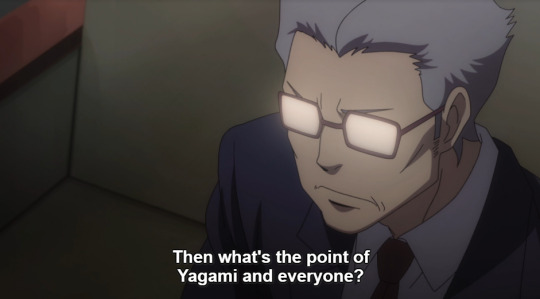
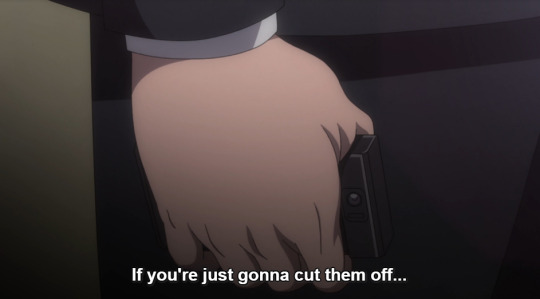
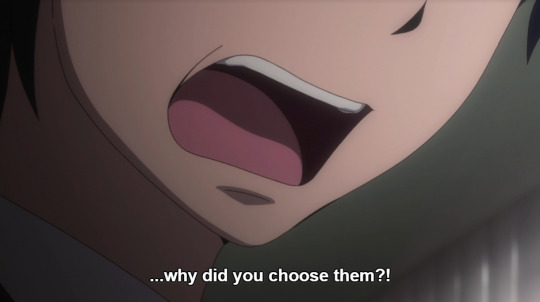
If you replace “Yagami” with “Maki” and “them” with “us”, it makes a lot of sense and showcases how traumatic that final battle was for Daigo’s crew. While he is definitely concerned for Taichi and the other kids, his concerns stem from his own experiences, and I wonder how much of his good-natured persona comes from him not wanting the kids to experience what he and Maki did. His natural niceness faded throughout this movie (although to be fair, it sounds like Daigo just lowkey lost his job lmao- “But we’ve been protecting them all this time!”) and his intentions were still A+, but it seemed like Daigo became comfortable using a bit more aggression as the situation grew more dire (i.e. talking some serious smack to the cops). I’m starting to think that Daigo’s repressed a lot of shit too, but was probabblyyy better at dealing with it than Maki was.
But, that’s fair. The world (almost?) met it’s end on his watch. The love of his life is losing it (and as we’ve learned, he blames himself). Lots of foreshadowing here, lots of questions swirling about what it means to be chosen, so...
On being chosen: I SO enjoyed the conversation in the cave! First and foremost- Sora! In my post on Shoushitsu I voiced my concerns about whether Sora’s character had actually developed. To me, it didn’t seem like she grew. Her issue with Piyomon was temporarily solved but I made the case that if the reboot happened all over again, Sora wouldn’t be able to handle it any better. I was pleased to see everything come full circle in Kyousei. Sora admitted, in front of EVERYONE, that she has a tendency to close herself off, that she’s LONELY, and that she knows what it’s like to have a THORN in her HEART. Piyomon was sleeping while all this went on, but I’m proud enough for both of us.
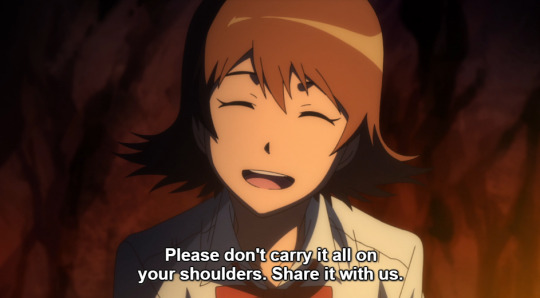
I also particularly liked the tidbits from Yamato. It was a nice callback to his cave scenes in adventure, and it’s a small reminder that these kids are developing in ways that aren’t always obvious in the overarching plot:
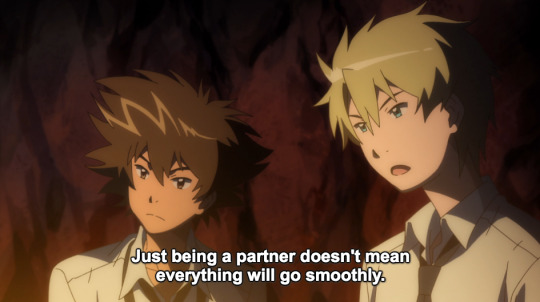
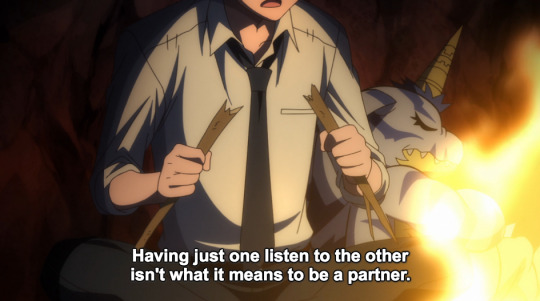
Takeru seems to instantly get what he’s saying, and the kids continue with their conversation of how they cope with being “chosen” and how they attempt to be good partners. Mimi straight up says that she balances Palmon out, and Sora ponders if that’s what it means to be a partner in the first place. Throughout all this, and throughout the movie, we see Meiko dealing with crippling sadness due to ‘being a bad partner’. I know some folks think it’s overdone and shouldn’t be as much of a focus, but I get the feeling this depression is supposed to be that obvious. Given Maki’s motivations and connections to the Mochizuki family, I wonder if Maki has been gaslighting Meiko, in a sense. I’d bet Maki is incredibly envious of anyone chosen, and if Meiko has a particular responsibility, or if Maki believes Meiko shouldn’t have been chosen, she’s probably primed her over years to be doubtful of her capabilities.
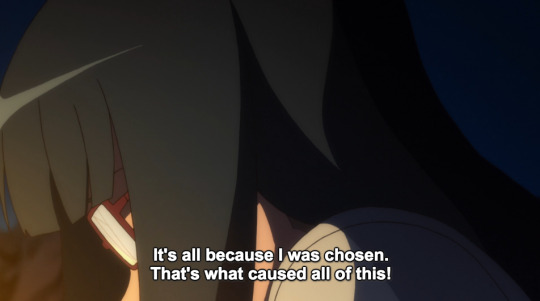
While everyone knows Meicoomon is to blame for the infections, etc, Maki was the first one to openly admit it, and she did it so dryly. I don’t know. It always stuck out to me. I don’t trust Maki as far as I could throw her, and I’m not very strong. I wouldn’t be surprised if the extent of Maki’s cruelty is revealed in Tri 6 and that the focus on Meiko’s depression serves a purpose. It’s dark, but this is Tri, and we’re all adults now thank you very much, Toei, I get it.
I’d like to make a case for Meiko’s sadness. I know the fandom is split on whether it’s too much of a focus or not, but I really think it’s necessary. When you go back and watch scenes from past movies after learning new information, everything is so purposeful. After learning that Meiko is meant to be Meicoomon’s balance, it becomes VERY obvious why Meiko was so hesitant and overly-apologetic in the past. You suddenly realize that every time Meiko apologizes for Meicoomon’s destruction, every time she bursts out crying, each day she skipped school after watching Leomon die, it’s because she genuinely believes the death, destruction, and trauma is due to her failure as the Libra’s balance. When Takeru told her Patamon was infected, she freaked because in her mind, it was her fault. I don’t think Meiko’s depression is overdone because it’s realistic. Can you imagine how much pressure she must have been under? From her father? From Maki? She could never fail. What if she got sick? Heck, what if she died? Who would control Meicoomon? That’s so fucked up. SO fucked up. And if her father is being truthful in Kyousei when he seems to just realize how much pressure his daughter is under, it leads you to wonder how Meiko came to understand she was responsible for containing Meicoomon’s powers. My money’s on Maki, and I’d bet a million dollars Maki was manipulative as fuuuuck. Since past movies have given us so many hints about what’s to come in the next installment, Meiko’s sadness leads me to believe we’ll learn the extent of what Maki’s done with the Mochizuki family all these years. What did her gaslighting ential? Why did she help them move to Tokyo? HOW DID HER HANDS “FALL INTO DARKNESS”? Put a pin in that last bit, because I’m gonna come back to it.
So, anyways, Daigo serves as a nice parallel to Taichi, and even Yamato, and I think Maki is meant to showcase a potential future for Meiko and Hikari. Meiko’s potential is obvious- a lost partner, a chosen being unchosen, the list goes on. At some point, though, DarkGennai mentions how those who are the most compassionate or fragile (or something along those lines) are the easiest to break and control. He’s referencing Hikari when he says it, but I wonder if he thought the same thing about Maki at some point. As Homeostasis can speak through them both, I think the similarities are there.
And the similarities continue for Tailmon and Meicoomon! I’ve discussed the importance of their similarities before, but while watching Tri 5, I noticed some similarities to episode 34 of adventure which seem especially relevant now that we’ve seen hints of Wizarmon on the Tri 6 poster:
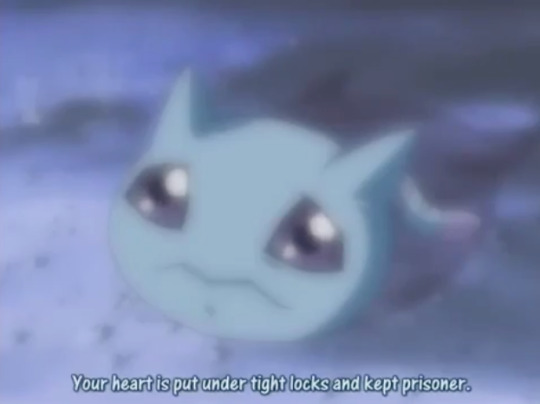
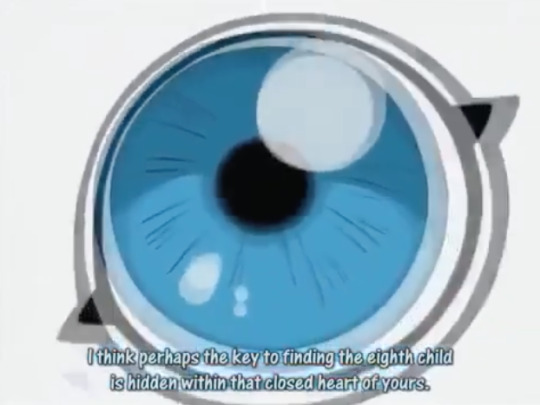
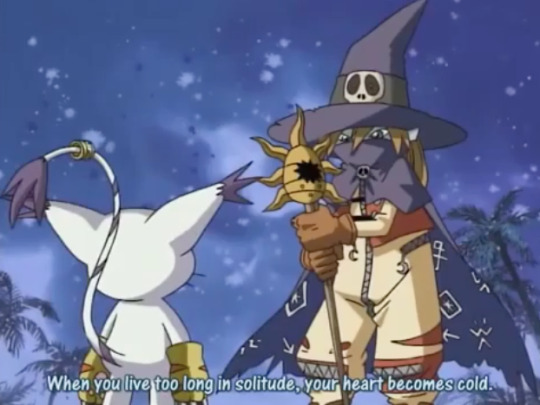
If you remember episode 34, or if you’re like me and needed to recently find a terrible streaming site to rewatch it on, you’ll know that Wizarmon is incredibly lonely when he meets Tailmon, that he has a heart of stone from being lonely, and is convinced that he’s going to die from it. Tailmon saved him, and Hikari saved Tailmon. Back in the cave in present times:
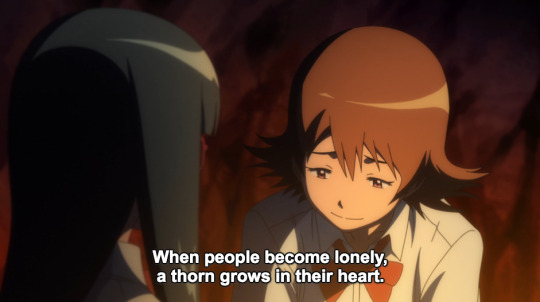
(Mr. Mochizuki references Meicoomon’s loneliness when his daughter wasn’t around, and Meiko’s been separated from her partner an awful lot recently. Hackmon talks about how Meicoomon was isolated and feared due to it’s power.)
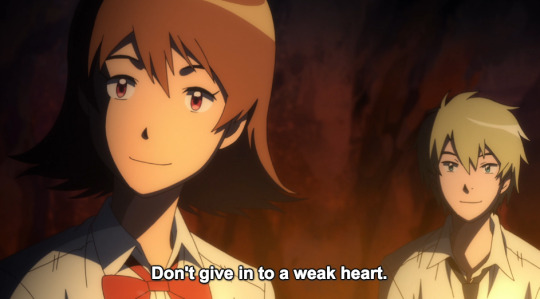
And then Hikari jumps in all too knowingly...
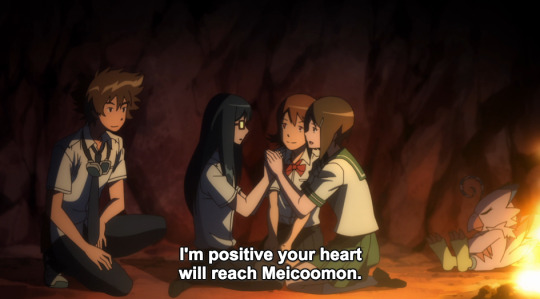
Interestingly, Wikimon has Meicrackmon VM’s card translated as follows:
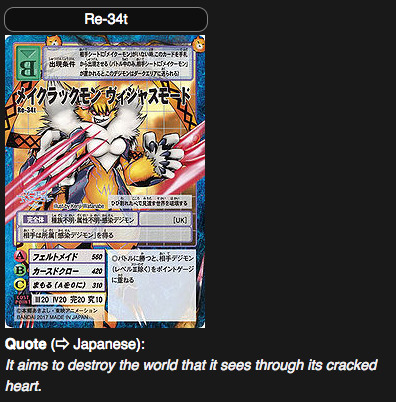
And wow, what a Fan Moment™ it would be for Wizarmon to swoop in and fix all of this (which hopefully he doesn’t literally do because THERE’S NO TIME LOL). In all seriousness, though, the meaning of being chosen, of being a partner, will definitely be a huge theme in Tri 6 and I’m excited to see what happens. I’m also wondering if anything will come of Maki’s cold heart- I believe Daigo described it that way in one of the prior movies?
Anyways, let me reel this back in for a second to discuss more briefly some smaller things I appreciated in Tri 5 before jumping in to the conclusion of it all:
The mature tone: I touched on this before, but a part of the movie that stood out to me was Mrs. Yagami’s naivety about her children’s success. She briefly displays some worry, decides Taichi + Hikari will be okay, and starts making them a ton of food. I’m sure half of his is denial, but I also think this scene wouldn’t have been second-guessed in adventure. Of course the kids are going to be fine because the heroes always win. Now though, Mrs. Yagami’s hope seems out of place. This is highlighted further when Taichi talks to her on the phone. Mrs. Yagami lightheartedly states that it’s been a long time since Taichi’s had a summer filled with so much excitement. When she said this, I instantly thought about how Taichi must have been reeling for adventure after returning home from the digital world. I’ve always imagined him sitting in class, staring out the window, daydreaming about what Agumon must be up to in the next world over. I was kind of shocked when his response was “What are you talking about?” This isn’t an adventure to Taichi anymore. It was always serious, but the innocence of childhood is long gone.
The attention to details: I need to respectfully disagree with the assertion that Tri is lacking details. I’ve found it to be full of callbacks, if you’re looking for them, and I think it’s taking the time to highlight little things it doesn’t necessarially have to show us. One example of this is the Ishida-Takaishi family dynamic. To me, it was unclear whether Yamato’s dad even answered the phone, and Yamato outright denies the chance to speak with his mother. When I was wondering what the chosen children were up to in the years before Tri, these were the sorts of details I was wondering about. The fact that Tri took the time for this scene, amongst others, is what gives me hope about the sixth movie actually being able to wrap things up.
I also appreciate the details that don’t necessarily involve callbacks. Very pleased about the fanfiction fodder that is Yamato being terrified of ghost stories, and Takeru totally willing to throw him under the bus about it. Uh, I also noticed how unnervingly quick Takeru was to whip up an excuse for the police. He seemed, er, a little too calm when running away.
The Sorami: I mean, did you think I’d make a post about this movie and not mention the Sorami? I APPRECIATE THEM SO MUCH LOL. IT HAS TO BE CANON, RIGHT? They were literally sleeping holding hands. I can’t. I digress...
The cramming of everyone digivolving into one single screen: THANK YOU.
Whew. This is getting long, but this brings me what I really want to talk about: The ending.
So, the second half of Kyousei is a lot. I may or may not have cried twice. Oh, and, surprise! There’s the dark ocean. I really didn’t mind Taichi & Meiko’s conversation but I also don’t really have much to add about it besides what I discussed before. I definitely noted that Meiko interprets “you shouldn’t have been born” to include both her and Meicoomon, and I’m not surprised Taichi snapped at her. I would also like to note that Meiko & Agumon’s conversation (was super cute) was kinda revealing. Meiko envies Taichi, along with everyone else. She apologizes for scaring everyone early, Agumon says he wasn’t scared, and Meiko flashes back to a bunch of moments in which Meicoomon was scared. That... didn’t sit right with me. I do believe that Meiko yearns for a more typical partnership with Meicoomon, but yet again we have an instance of Meiko seemingly toying with the idea of giving it all up.
On Yamato: WOW! Okay, so, my absolutely favorite part of the movie is when Meiko asks the chosen children to kill Meicoomon. Yamato’s been pushing Taichi to stop hesitating, to stand with his friends, to do what’s right. After sprinting into the digital world monologueing about the importance of protecting friends, much to Yamato’s satisfaction (...i presume), he makes the decision that Meiko is right and that they should, indeed, kill off her partner. Not only is this in obvious contract with Yamato’s crest, but it’s got to be fucking infuriating to watch your closest ally step up to the plate just in time to kill off someone the chosen have spent a lot of time protecting. I understand Yamato as the type of character to keep his grievances private. He’ll shoot you a glare from across the room and fight back if you’ve hit his temper, but I don’t think he’s the type to let other people see his anger make him weak. This... I think this was Yamato’s low point, and he aired it out in front of fucking e v e r y b o d y. After grabbing Taichi by the collar and pushing him away, Yamato just stands there and screams. I can’t think of a time he’s ever done something like that. He is SO internally conflicted, and frustrated, and sad, and dare I say... lonely? You SAW how sad he was (he blushed!) when confronting Taichi about Omegamon breaking up early. I think this is foreshadowing a major plotline for the final movie. After all, Yamato hasn’t truly had a solo-arc yet.
On Hikari: Hikari’s another one who will be front and center in the sixth movie. Her arc is definitely not over, and I’m excited for the potential of her plotline intersecting with Yamato’s. I’m reminded of the Vamdemon arc from Adventure and how horribly awkward it was for Yamato to take care of Taichi’s little sister. I hope we see that sorta tension again. And listen, I truly understand everyone’s frustration with Hikari not being the main focus of her movie. I do think it’s a bit problematic that we base our expectations on who shows up on the next poster, but I understand. I do. It sucks. I would have been mad if this was Sora, yet while I understand, I’m not particularly bothered. It’s obvious that Hikari will play a huge role in the final movie. Also, if you can imagine me holding a giant flashing arrow and pointing it towards 02, that’s exactly what I’m doing right now. All you Hikari fans got like, a season and a half and two movies where Hikari played a major role. There’s also the potential that if Tri goes on to Tri 02 (please, hear my prayers, amen), she’ll also play a huge role. I do think that we’ll learn more about older Hikari as Tri finishes up, so this is where I’m at right now. I’m fine spending more time with some of the other kids. I’m fine watching them interact with a new character. Not everyone has to agree with me, like please, be mad about it if that’s how you feel! This is just my two cents.
On Taichi: You selfless, stupid idiot. Youuu infuriating contradictory little shit. You in all of your poorly-timed nobleness pulled a Jack-from-Titanic and let yourself die when Omegamon could have TOTALLY swooped on over to you and picked you and Daigo up. THERE WAS ROOM FOR EVERYONE UNDER HIS ARMS. Dammit, Taichi. You just killed your sister, broke Sora’s heart, and jump-started Yamato’s looming mid-life crisis all in one go, and beyond the fourth wall, we all know you’re kicking around underground with Daigo having a heart-to-heart about what the morality of adulthood entails, every once in awhile stopping to say “shit, we should probably try and get back up there, right?”
Okay, okay, I’m being unreasonable. I really do love the angst. Taichi falling into a very cartoon-y certain non-death makes me wonder, though, if he had a sense something like this was coming. Once again, the focus on his hesitation and reflectiveness seems purposeful. It reminds me of the way people might act before they die. What am I here for? What can I do? What’s the purpose of it all? It makes sense that he’s stuck with Daigo, as I think he’s been asking himself the very same questions. His easy-going nature conflicts with his role and remembering how got all serious with the police and so on... it seemed unnatural for him (although I was here for it tbh, hey Daigo). Perhaps he’s also still stuck in this kid-adult limbo. ANYWAYS-
In my Loss review, I discussed how it’s actually fairly common for Taichi to hesitate. He truly does go back and forth between being a hot-head and overthinking things, but it’s struck me recently that many of the moments in which he hesitates involve a realization of his own mortality and relative insignificance in relation to everything going on in the universe around him. Going back and watching the other movies, watching Taichi + Yamato bicker about what the right thing to do is, how to avoid the most death and tragedy... it seems sort of cruel. I’m sure it wasn’t intentional but as Yamato made the case for saving more civilians by doing something, Taichi’s blank stare, his hesitation... it’s almost as if he knows he’s stuck in purgatory and yeah, they could do something, but hey Yamato, “I don’t wanna die. I’ll die too.”
As I type that out, I’m now realizing those are the words I’ve been looking for all of Tri. Taichi’s moving like he’s trying to navigate purgatory and he’s not sure which choices will show him the light.
As Taichi made the ultimate sacrifice, I was reminded of this scene on Loss:
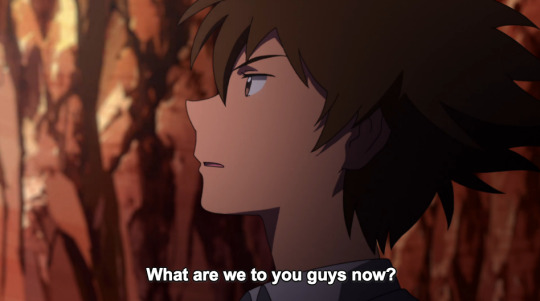
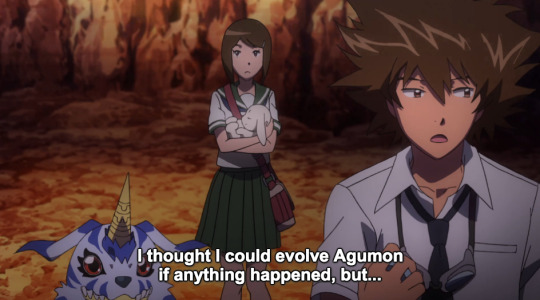
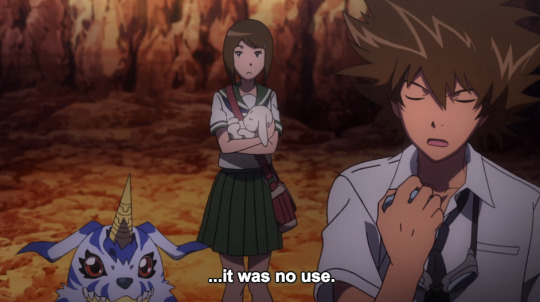
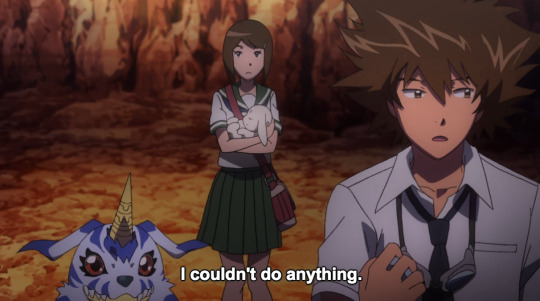
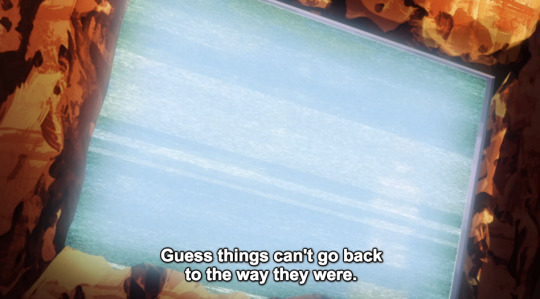
Taichi did something. And I’ll leave it at that. I felt a lot of sadness going back and watching this scene but I’m not quite sure what to make of it yet. All I can say is that when Yamato demanded that everyone stand, I was glad Sora was the first one who did.
On the ending: As Hikari’s digimon chased after her, calling her name each time Hikari called for Taichi, I wanted to reach out and tell it to be quiet. Hikari was so shocked and mournful, but still, that sentiment is so anti-ethical to who Hikari is. We’ve had all this talk about partners, and I found it peculiar for Hikari to mumble that she was supposed to be at her brother’s side. She over-relies on him so much that even Takeru gets annoyed with it. So what can a partner do? Evolve to Ophanimon FM, I guess.

Ophanimon, born from Hikari’s despair and closed off heart, Hikari, being the one DarkGennai references as being so easy to manipulate due to her fragility.
Which is all... fine and evil. Just... after the perfectly creepy jogress evolution we saw... what the ffuck digimon is that? It definitely is not Mastemon but it reminds me of Mastemon, given it’s description. It doesn’t really make sense, but I felt like I needed to contribute something lol. It’s listed as being able to evolve from Meicrackmon VM but... I don’t know. I really have no evidence putting this forward as even a basis for what we saw in Kyousei besides “I just think it sounds kinda similar” so I’m gonna go ahead and wrap up with my final thoughts.
The Dark Ocean: Well, they committed! The dark ocean is involved in Tri and is seemingly the third world that the title of Tri may be referencing. If the Dark Ocean is here though, I’m also assuming Demon is too. It would make sense I suppose, him swearing revenge on the 02 kids and promising to free himself as revenge against the ultimate being of good in the digital world.
So, nothing is creepier than Maki standing over the dark ocean, gun in hand, arms outstretched like she’s the world’s savior: a holy trinity all in one person. The waves knock her down and that’s the last we see before flashing to Daigo’s memories.
I’m left wondering how Maki got into the world of darkness in the first place. I remember Ken using his own darkness to open a portal and am wondering if his image being used as an avatar was some type of foreshadowing. Have the 02 kids been trapped there? Is there where Taichi and Daigo are busy tumbling to? Is the dark ocean’s existence throwing off the balance between the human world and the real world, grabbing hold of the link between them and dragging it down?
In any case, there’s a lot to ponder here. When the kids don’t even know who they’re fighting it’s difficult for the audience to figure out the players. At first mention of Apocalymon, I wondered if the intent was to bring him back. I then wondered, after seeing the dark ocean, if he manifested as part of the dark world himself, or if he manifested as Maki’s manipulated dread and jealousy. Are her emotions in a sense, Apocalymon, and the source of the shard? I’m now enticed to think about Demon sitting in the dark ocean for years, plotting revenge. Demon originally came to light because Ken dipped his hands into darkness. Apparently, Maki’s done the same. Word. For. Word. I think it makes sense for her suffering to resemble Ken’s. I think she is a true chess piece of a victim and tbh I don’t see her making it out alive. Send Daigo my regards. Movie 6 will be rough and I would not be surprised to see her atone for her sins before a very Oikawa-like death, sacrificing herself to restore balance to all.
As I said in my Loss review, I’m really not that familiar with all the lore in this fandom and most of what I learn comes from my own research (aka late night searches on wikimon). While perusing Demon’s page, I noticed this:
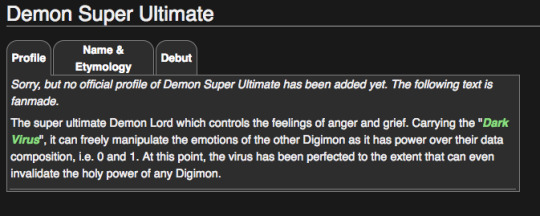
Note that it’s fanmade, but I’m wondering if anyone knows where this came from? It makes sense so in the context of Tri I almost feel like I’m being trolled. Anyways.
I’d like to note that after the “reboot” Maki notes that the net ocean hasn’t appeared yet. I wonder if the overarching goal is to birth a new digital world from this ocean of darkness instead. I can’t really think of anything more guaranteed to throw off the universe’s balance than that.
So here we are. Much like everyone’s feelings about Tri, this review is a mess. I’ve edited it so much and I’m still left with something I’m terribly unhappy with, but I wanted to put it out there before Tri 5 got too far away from me. If you read all of this, thank you? It’s a jumble of thoughts and unverifiable theories that you all can probably debunk in a matter of minutes. See u all in spring/summer 2018 oh my fucking god. Until then, our kids are left on a no-man’s land resembling the place where the original chosen and the 02 kids fell. Meiko, in her envy of Taichi, now carries Koromon in her arms after Taichi’s apparent death. And I don’t want to be the one to say it, but... As we all ponder the meaning of being chosen, whether being chosen matters if you can so easily be cast aside, and how to stretch the limits of being a good partner...
Mrs. Yagami’s food is going to get awfully cold.
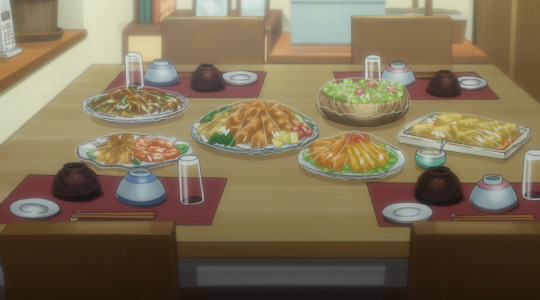
#tri spoiler#tri spoilers#EVEN I don't want to go back and read what i wrote so this is not edited well#tri;#i wanted to get down all my thoughts so i could at least remember my first reactions to make better posts later#ooc;#lmao ok i read a bit this starts off kinda strong and then at the end it just crumbles you can feel it#bye;;;;;;
22 notes
·
View notes